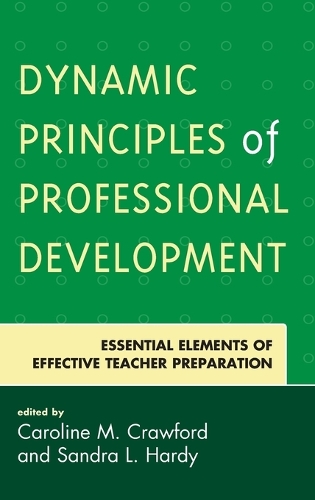
Dynamic Principles of Professional Development: Essential Elements of Effective Teacher Preparation
(Hardback)
Available Formats
Publishing Details
Dynamic Principles of Professional Development: Essential Elements of Effective Teacher Preparation
By (Author) Caroline M. Crawford
Edited by Sandra L. Hardy
Bloomsbury Publishing PLC
Rowman & Littlefield Publishers
18th October 2017
United States
Classifications
Professional and Scholarly
Non Fiction
370.711
Physical Properties
Hardback
138
Width 159mm, Height 237mm, Spine 15mm
349g
Description
Dynamic principles of professional development are directly and indirectly defined and applied with no particular order of sequence as one or more of these principles may be activated in unison and revisited time and again in varied degrees and contexts throughout a professionals career. Further, this is by no means a list in the entirety of all professional principles pertaining to education, but rather a representation of the basis for the dynamic interchange that transpires and elevates professional development that is energized and authentic. These Dynamic Principles of Professional Development are as follows: introspection, participation, collaboration, transformation, identification. Dynamic principles of professional development both illustrate and apply standards and dispositions evident within real world classroom engagement, and while working closely with teachers, administrators, and university based instructors. Classroom teachers as associated teacher educators routinely demonstrate the characteristics of these dynamic principles of professional development in their practice. These principles often reflect elements of effective teacher preparation. Thus, these dynamic principles of professional development illuminate the key qualities of classroom teachers as associated teacher educators. Further, these dynamic principles enrich and expand the evolving definition of classroom teachers as associated teacher educators as the central focus of this text.
Reviews
The current state of the profession is described in this book. Approaches to teacher professional development led by or in partnership with teacher preparation programs are described in the various chapters. It will be an excellent resource for teacher education programs to develop strategies to support their graduates during their novice teaching years. -- Raymond M. Rose, Online Learning Evangelist, Rose & Smith Associates
Dynamic Principles of Professional Development: Essential Elements of Effective Teacher Preparation is an important resource for teacher educators in both the P-12 and higher education arenas. This text addresses inquiry as a crucial component of professional development in the preparation of mentors, the development of induction programs, the continued support of cooperating teachers and much more. The chapters authors provide detailed descriptions of existing programs and insights for providing strong professional development programs based on inquiry in support of continued preparation of novice and experienced teachers. A must read! -- D.John McIntyre, Professor Emeritus and Senior Visiting Professor in Curriculum Studies, Southern Illinois University
Dynamic Principles of Professional Development: Essential Elements of Effective Teacher Preparation effectively discusses the mutual benefits of partnerships between higher education and K-12 institutions. Educator preparation programs are enhanced by the mentoring and support that teacher candidates receive from associated teacher educators. P-12 institutions benefit when associated teacher educators engage in professional development for the benefit of the larger school community. Associated teacher educators benefit personally and professionally from these increased opportunities. With these understandings, the editors and authors provide theoretical and practical frameworks to define and illustrate five components of professional development: introspection, participation, collaboration, transformation, and identification. Teacher educators, P-12 teachers, and school/district administrators will enjoy reading about exemplary professional development models for mentors, new teachers, teacher-leaders, preschool teachers, and communities of practice. -- Annette D. Digby, EdD, dean, Thayer School of Education, Wingate University, Wingate, NC
This text is especially relevant at a time when teacher educators are focused intently on increasing the quality of teacher candidates. Although teacher preparation involves both high-quality instruction and coursework at the university level and mentorship by skilled classroom teachers in school-based field experiences, in this volume, the editors focus on the integral role of classroom teachers as associated teacher educators who work in partnership with university faculty in the preparation of teachers. The editors have assembled an engaging set of chapters that exemplify the link between professional development and teacher preparation and illustrate ways in which associated teacher educators work with interns to enhance teaching and learning. This will be an excellent resource for all who are interested in teacher preparation. -- Rebecca Shankland, Associate Professor, Reading Education and Special Education, Appalachian State University
Author Bio
Caroline M. Crawford is an associate professor of instructional design and learning technologies at the University of Houston-Clear Lake. She focuses her areas of impact upon instructional design, performance improvement, and learning theories within communities of learning, communities of practice and the appropriate and successful integration of technologies into differentiated learning environments of distributed including online and mobile, hybrid and traditional. Sandra L. Hardy is founder and executive director of Hardy Education Resources. Her primary areas of focus include research and development pertaining to leadership and induction of K-12 and higher education educators, administrators and other educational professionals development, and related programs. Her services are based on the unique needs of the individual teacher as learner in connection to promoting effective communities of practice through dynamic collaborations while identifying and securing the required multilevel resources.
